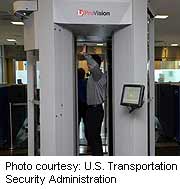
TUESDAY, Nov. 23 (HealthDay News) — With this coming Wednesday the busiest travel day of the year, many Americans will soon be subjected to radiation-emitting body scanners at the nation’s airports.
Despite a rising tide of concerns and complaints in recent weeks over body scanners, most experts say the radiation exposure from these machines is too low to pose any serious health threat.
Peter Rez, a professor of physics at Arizona State University, said that when a scanner is working properly the amount of radiation exposed is very low.
“The probability of getting a fatal cancer is about one in 30 million, which puts it lower than the probability of being killed by being struck by lightning in any year in the United States, which is about one in 5 million,” he said.
“However, it’s a mechanically scanned system, and if the scanning mechanism were to jam, something which is quite possible, then one could get a very high-level dose [of radiation],” Rez noted.
The body scanners have a mechanism that shuts off the machine should something go wrong, but Raz is concerned that should that system fail a person could end up with a radiation burn.
“I opt not to go through [the scanner], because I don’t know what the probability of failure is,” Rez said.
But Peter Kant, a spokesman for Rapiscan Systems, the makers of such scanners, said that “they are completely safe. They have been thoroughly tested.”
“The dose of radiation is equivalent to 1/1000 of a dental X-ray,” he added.
Kant added that the system has multiple safety mechanisms, and that “we have never had a problem.”
Two types of scans — millimeter wave scanners and backscatter scanners — are used in the United States.
Millimeter wave scanners, which use radio waves, have no proven adverse health effects and don’t expose passengers to any X-rays, but they haven’t been widely studied. Backscatter scanners use extremely low levels of X-rays.
However, the real question for Rez is whether exposure to even this small an amount of radiation can be justified by the threat of terrorism. The probability of getting cancer from a scanner is low, but so is the probability of being blown up in an airplane, he reasoned.
“It’s probably equal to or less than the probability of a fatal cancer from the body scan,” he said. “It’s pointless. I don’t see a reason to do it. It’s totally show.”
David A. Schauer, executive director of the National Council on Radiation Protection and Measurements, which helps assess radiation risks, said the council gave a series of recommendations about the use of airport scanners.
The first recommendation dealt with the justification for exposing people to a new source of radiation. “That is really the purview of government,” Schauer said.
However, justification means doing more good than harm, he said. “There has to be good reason to image the person, and in the case of security screening there has to be a security reason.”
In response to the outcry from passengers, the federal government has said they will review the current screening policy, but believe it is justified by the threat of terrorism.
For travelers who balk at going through the scanner, another controversial procedure — the full body pat-down — awaits.
“If you are directed to pass through an AIT [Advanced Imaging Technology], you may opt out,” U.S. Transportation Safety Administration Administrator John S. Pistole said in a statement. “If you choose to opt out, you will receive a thorough pat-down by someone of the same gender. If you alarm either the metal detector or the AIT, you will also receive a thorough pat-down by someone of the same gender.”
More information
For more information on airport scanners, visit the U.S. Transportation Safety Administration.

